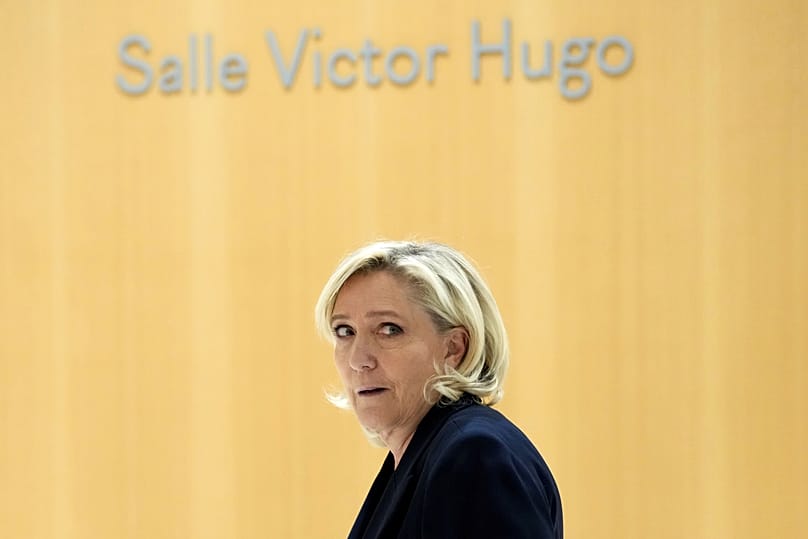The far-right leader has vowed to exhaust all legal avenues to overturn her five-year ban from public office. Where does she stand in efforts to appeal her sentence?
Misleading posts circulating on X claim that an appeal lodged by French far-right leader Marine Le Pen against a conviction barring her from running in the 2027 presidential election has been rejected.
In March, Judge Bénédicte de Perthuis sentenced Le Pen to a five-year ban on holding public office, effective immediately, after finding she was "at the heart" of a scheme to embezzle European parliamentary funds.
The Paris Criminal Court also handed down a four-year prison sentence — two years suspended and two to be served with an electronic bracelet — along with a €100,000 fine. Le Pen has described the verdict as a "political witch-hunt" and declared she would exhaust all legal avenues to overturn it.
One widely shared post, which has amassed more than 600,000 views, claims that her appeal has already been denied, that the "French people are outraged", and that the "EU is behind" the rejection.
But where does Le Pen actually stand, and do any of the post's claims hold weight?
Has Le Pen’s appeal been rejected?
Essentially, to try and overturn her presidential ban as quickly as possible, Le Pen launched two separate challenges along French administrative and criminal paths.
On 15 October, the Council of State — France's highest administrative court — rejected a legal challenge made by Le Pen against the country's electoral rules.
It's this administrative challenge that the post is likely referring to. As it happened weeks ago, it's not breaking news, and it's also separate from the appeal against her criminal conviction, which hasn't been heard yet.
The administrative challenge concerned Le Pen's removal from the electoral list in the Pas-de-Calais department, where she is an MP.
"Since she's hit a wall in the criminal courts, Le Pen tried a side route: taking her case to the administrative courts," Camille Aynès, constitutional law expert at the University of Paris Nanterre, told The Cube.
"Why go that way? Not really to win back her council seat. The real goal was strategic — to create a case that would allow her to raise a 'priority question of constitutionality' (QPC)," she said. "That's a special French mechanism allowing someone in a lawsuit to ask whether the law applied in their case violates the Constitution."
Ultimately, the Council of State refused to pass her challenge along. The criminal provisions that Le Pen contested, according to the court, were either non-existent or unrelated.
"The criminal provisions she was challenging weren’t even applicable in this administrative dispute," Aynès told The Cube. "In other words, this wasn't a backdoor appeal of her criminal conviction."
The main impact of the Council of State court's rejection is that Le Pen lost an opportunity to have the issue reviewed quickly, instead of waiting months for her appeal trial.
It's an issue that she will have wanted to resolve quickly amid the political unrest in France — if President Emmanuel Macron called snap presidential elections, they could take place before Le Pen's criminal appeal ruling, leaving her unable to run, whatever the subsequent result is.
Appeals yet to come
Despite claims made by online users that her appeal has been denied, Le Pen is launching a separate and larger appeal against her criminal conviction — the outcome of which is far from decided. A trial has been scheduled from 13 January until 12 February next year.
A verdict in this trial is expected before the summer, which would still give Le Pen time to stand in the 2027 presidential election, provided her sentence is overturned or reduced.
"The Council of State still has to rule on another QPC Le Pen filed over her removal as a regional councillor — but experts expect the outcome to be the same: no referral to the Constitutional Council," Aynès told The Cube.
In July, Le Pen also sought an interim measure from the European Court of Human Rights — a Strasbourg-based court which interprets the European Convention on Human Rights — to quash the immediate application of her five-year ban. Her request was denied.
"At this point, only the criminal appeal can change things," Aynès said. "If her verdict is upheld, she can then turn to the Court of Cassation [France's supreme court for civil and criminal cases]."
Is the European Union to blame and how popular is Le Pen?
As for the claims that the "EU is behind" Le Pen's ban, they're also wrong: the case and the conviction are entirely under the French judiciary.
The details in the case date back to when Le Pen was an MEP. Prosecutors say that, between 2004 and 2016, she and several of her party members diverted funds meant to pay for parliamentary assistants to finance party activities in France.
According to Aynès, the wrongdoing only stopped because the European Parliament blew the whistle.
"That's the only sense in which the EU can be said to have been 'involved' — it alerted prosecutors," she said.
Similar narratives conflating the European Union's role in national courts were repeated on social media after Romanian presidential candidate Călin Georgescu was banned from running in the country’s presidential election by the constitutional court.
Despite her legal woes, Le Pen and the National Rally (RN) party remain popular, so that part of the X post is true. At the time of her conviction, an Ifop Opinion poll placed her at 37%. More recent polling puts her and RN president Jordan Bardella between 33 and 37%, ahead of their political rivals.
Other claims that Bardella will run for her party as a presidential candidate are also unconfirmed, despite the 30-year-old having Le Pen's vocal backing. RN did not respond to The Cube's request for comment on the matter as of the time of publishing.
















